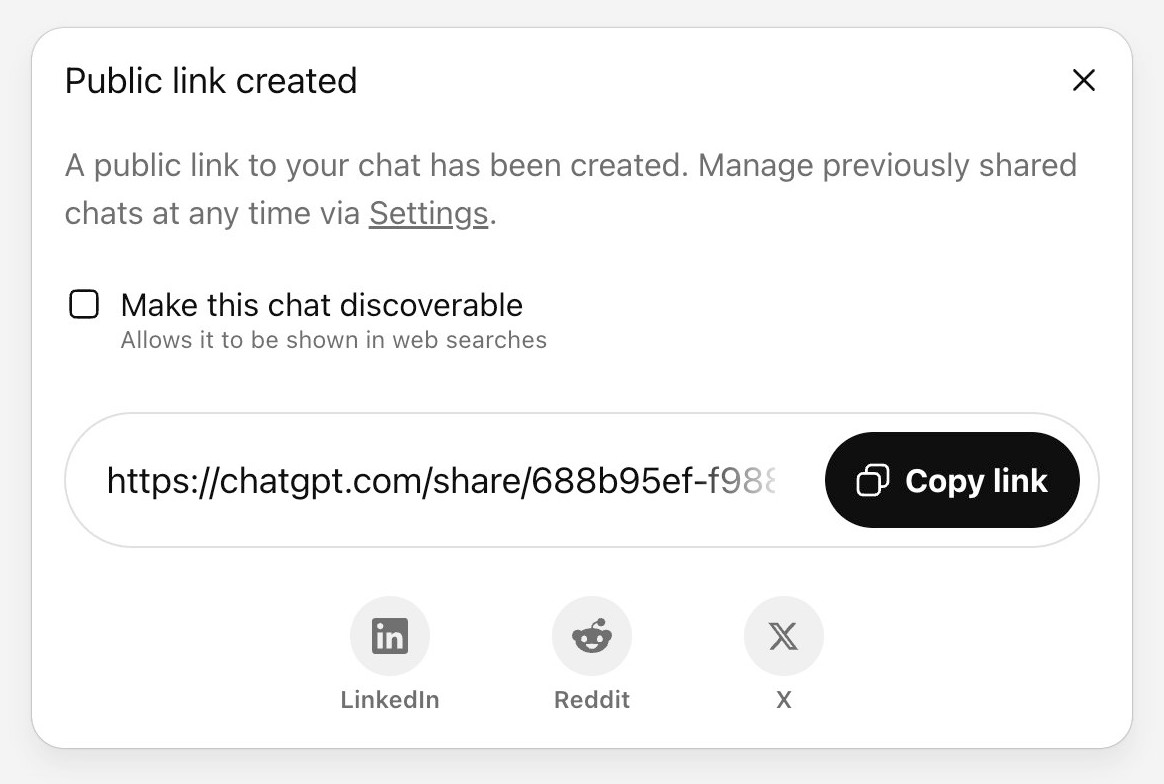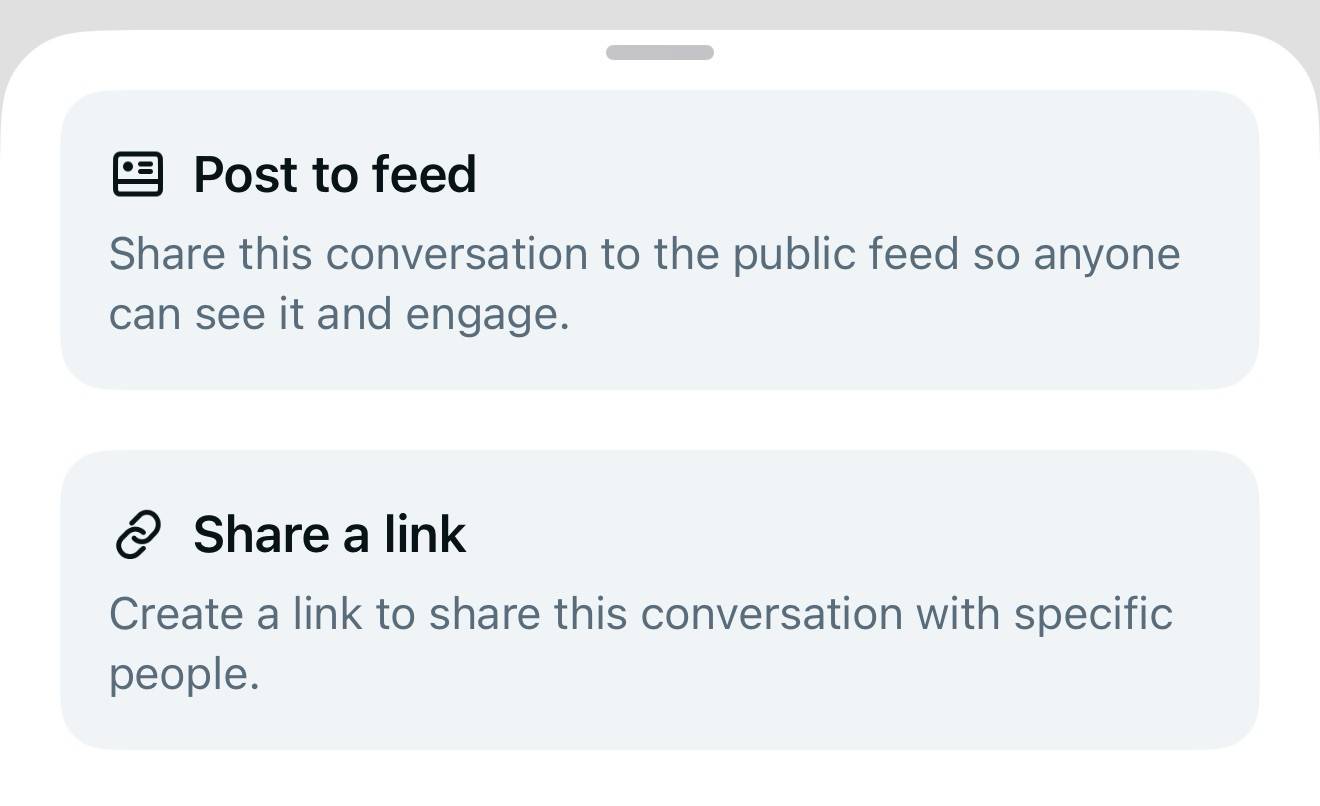The ChatGPT sharing dialog demonstrates how difficult it is to design privacy preferences
3rd August 2025
ChatGPT just removed their “make this chat discoverable” sharing feature, after it turned out a material volume of users had inadvertantly made their private chats available via Google search.
Dane Stuckey, CISO for OpenAI, on Twitter:
We just removed a feature from @ChatGPTapp that allowed users to make their conversations discoverable by search engines, such as Google. This was a short-lived experiment to help people discover useful conversations. [...]
Ultimately we think this feature introduced too many opportunities for folks to accidentally share things they didn’t intend to, so we’re removing the option.
There’s been some media coverage of this issue—here are examples from TechCrunch, TechRadar, and PCMag.
It turned out users had shared extremely private conversations and made them discoverable by search engines, which meant that various site:chatgpt.com ... searches were turning up all sorts of potentially embarrassing details.
Here’s what that UI looked like before they removed the option:

I’ve seen a bunch of commentary, both on Twitter and this Hacker News thread, from people who are baffled that anyone could be confused by such a clear option in the UI.
I think that confusion is warranted. Let’s break it down.
Here’s the microcopy in question:
Make this chat discoverable
Allows it to be shown in web searches.
The first problem here is the choice of terminology. “Discoverable” is not a widely understood term—it’s insider jargon. “Allows it to be shown in web searches” is better, but still requires a surprisng depth of understanding from users before they can make an informed decision.
Here’s everything a user would need to understand for this to make sense to them:
- What a URL is, and how it’s posssible to create a URL that is semi-public in that it’s unguessable by others but can still be read by anyone you share it with. That concept is a pretty tall order just on its own!
- What a web search engine is—that in this case it’s intended as a generic term for Google, Bing, DuckDuckGo etc.
- That “web search” here means “those public search engines other people can use” and not something like “the private search feature you use on this website”.
- A loose understanding of how search engines work: that they have indexes, and those indexes can selectively include or exclude content.
- That sites like ChatGPT get to control whether or not their content is included in those indexes.
- That the nature of a “secret URL” is that, once shared and made discoverable, anyone with that link (or who finds it through search) can now view the full content of that page.
ChatGPT has over a billion users now. That means there is a giant range of levels of technical expertise among those users. We can’t assume that everyone understands the above concepts necessary to understand the implications of checking that box.
And even if they have the pre-requisite knowledge required to understand this, users don’t read.
When people are using an application they are always looking for the absolute shortest path to achieving their goal. Any dialog box or question that appears is something to be skipped over as quickly as possible.
Sadly, a lot of users may have learned to just say “yes” to any question. This option about making something “discoverable”? Sure, whatever, click the box and keep on going.
I think there’s another factor at play here too: the option itself makes almost no sense.
How many people looking for a way to share their chats are going to think “and you know what? Stick this in Google too”?
It’s such a tiny fraction of the audience that a logical conclusion, when faced with the above option, could well be that obviously it wouldn’t put my chats in Google because who on Earth would ever want that to happen?
I think OpenAI made the right call disabling this feature. The value it can provide for the tiny set of people who decide to use it is massively outweighed by the potential for less discerning users to cause themselves harm by inadvertently sharing their private conversations with the world.
Meta AI does this even worse
A much worse example of this anti-pattern is Meta AI’s decision to provide a “Post to feed” button in their own Meta AI chat app:

I think their microcopy here is top notch—the text here uses clear language and should be easy for anyone to understand.
(I took this screenshot today though, so it’s possible the text has been recently updated.)
And yet... Futurism, June 14th: People Don’t Realize Meta’s AI App Is Publicly Blasting Their Humiliating Secrets to the World.
Once again, when your users number in the millions some of them are going to randomly click things without understanding the consequences.
The Meta AI iPhone app (fun fact: it can talk to you in the voice of Dame Judi Dench or John Cena) shows that public feed on the homepage when you first open the app, presumably to try and help people get over the blank slate “what is this thing even for” problem. They do not appear keen on losing this feature!
More recent articles
- I vibe coded my dream macOS presentation app - 25th February 2026
- Writing about Agentic Engineering Patterns - 23rd February 2026
- Adding TILs, releases, museums, tools and research to my blog - 20th February 2026